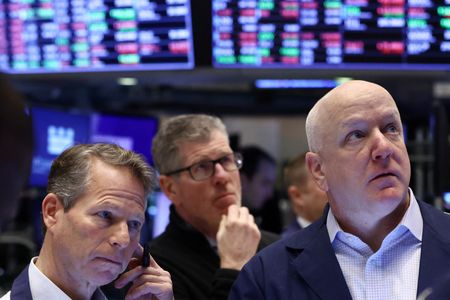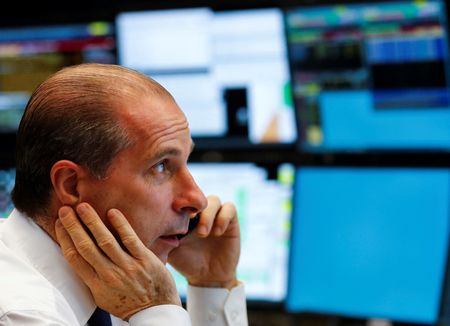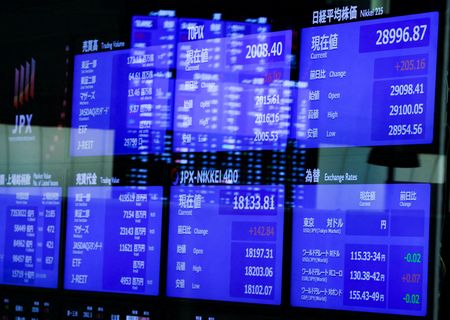


By Sinéad Carew
(Reuters) – The S&P 500 ended Tuesday’s volatile session slightly lower while the dollar was barely higher on Tuesday after data showed U.S. consumer inflation stayed sticky in January, pushing out expectations for a Federal Reserve rate-hiking pause.
While Wall Street’s equity indexes swayed between positive and negative territory during the session, U.S. Treasury yields were higher on investor expectations for tighter monetary policy.
The consumer price index increased 6.4% in the 12 months through January, marking its smallest annual rise since late 2021 but faster than the 6.2% economists had expected as Americans were burdened by higher rental housing and food costs.
Month-on-month, consumer prices rose 0.5% in January, after gaining 0.1% in December, the Labor Department said on Tuesday.
“The concern today is that inflation is not coming down fast enough and the Fed has to stay hawkish. When the bond market gets jittery it translates into the stock market,” said John Augustine, chief investment officer at Huntington National Bank in Columbus, Ohio.
Along with the data, Augustine pointed to contrasting messages from officials as a reason for the stock market’s struggle to find a direction on Tuesday.
Philadelphia Fed President Patrick Harker said the Fed is not finished raising rates yet but is “likely close.”
But New York Fed President John Williams said while inflation is moderating, the central bank has a ways to go to slow price increases and it may take years to hit its 2% inflation target.
While some investors had harbored hopes the Fed could pause rate hikes after the next meeting, the data implied otherwise.
“I don’t think (this report) moves the needle for the Fed, and I suspect they’re taking a hard look at the data. Does it mean we are headed for at least two more rate hikes? Absolutely,” said Peter Cardillo, chief market economist at Spartan Capital Securities, New York.
“My guess is the year-over-year decline in topline and core (CPI) suggests another 25 basis point hike in March and another one in May.”
The S&P 500 lost 1.16 points, or 0.03%, to end the session at 4,136.13 after earlier rising as much as 0.54% and falling as much as 1.02%.
The Dow Jones Industrial Average fell 156.66 points, or 0.46%, to 34,089.27 while the Nasdaq Composite added 68.36 points, or 0.57%, to 11,960.15.
The pan-European STOXX 600 index closed up 0.08% and MSCI’s gauge of stocks across the globe ended up 0.10%.
In currencies, the dollar index rose 0.029%, well above the greenback’s session low, which was a decline of 0.73%, but below its intraday high, which was a 0.26% gain.
The euro up 0.14% at $1.0735 while the Japanese yen weakened 0.49% versus the greenback at 133.07 per dollar. Sterling was last trading at $1.2168, up 0.27%.
In U.S. Treasuries, benchmark 10-year note yields were up 2.8 basis points to 3.747%, from 3.719% late on Monday. The 30-year bond yield was last down 1.2 basis points at 3.7799%, from 3.792%. The 2-year note was last was up 8.1 basis points to yield 4.6154%, from 4.534%.
Oil prices fell after the U.S. government said it would release more crude from its Strategic Petroleum Reserve, lifting some supply concerns from the market.
U.S. crude settled down 1.35% at $79.06 per barrel while Brent finished at $85.58, down 1.19%.
Spot gold added 0.1% to $1,854.99 an ounce. U.S. gold futures gained 0.11% to $1,854.00 an ounce.
(Reporting by Sinéad Carew, Stephen Culp, Stella Qiu, Susan Mathew and Amanda Cooper; Editing by Chizu Nomiyama, Christina Fincher and Chris Reese)

